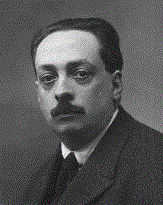Spain: Blas Cabrera Felipe
(20th May 1978 – 1st August 1945)

Born in Arrecife on the Spanish island of Lanzarote, Blas Cabrera Felipe is often regarded as the father of 20th century physics in Spain. His specialist research area was in electricity and magnetism but he also contributed to the general promotion of physics research in this country.
He is particularly known for contributing to the knowledge of magnetic moments and susceptibility:
- He analysed susceptibility in terms of the Weiss magneton.
- He made detailed measurements of the diamagnetic susceptibility of water.
- He modified Curie-Weiss's law, which describes the magnetic susceptibility of a ferromagnetic material in the paramagnetic region beyond the Curie point.
- He deduced an equation to describe the magnetic moment of an atom taking temperature into account.
Blas’s achievements have helped enrich the understanding of magnetism, including the magnetic moment of neutrons. As neutrons have a magnetic moment, they act as microscopic magnetic dipoles and interact with other magnetic moments, e.g. electron clouds around atoms. This is exploited in neutron scattering techniques to determine the magnetic structure of materials.
But Blas is also quite literally a father of physics. His son Nicolas Cabrera (1913- 1989, born in Spain) and his grandson Blas Cabrera (born in 1946 in France) also continued the family business as research physicists.
Nicolas produced the fundamental theory of crystal growth (possibly very useful for our Crystal Growth Work Package) and worked with Neville Mott on their theory of the oxidation of metals.
Blas is currently a particle physicist at Stanford University searching for dark matter in the form of weakly interacting massive particles (WIMPs) but he is also well known for his work on magnetic monopoles – continuing the magnetic legacy of his grandfather.
References:
IEE Explore
www.biografiaszvidas.com
www.nicolascabrera.es
Back to The Road to the ESS